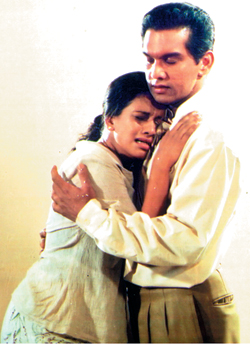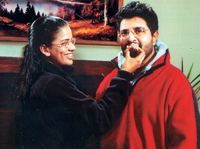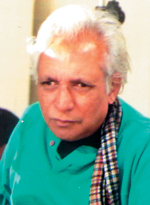|
‘Sewwandhi’:
Another dramatic twist by Obeysekere
By Susutha R. Fernando
‘A director/ artiste should not be guided
by the audience; audience should be guided by the artiste’
saidveteran filmmaker Vasantha Obeysekere speaking on filmmaking
in Sri Lankan cinema and about his latest directorial venture "Sewwandhi"
(The Rose).
 |
| Kamal Addaraarachchi and Sangeetha Weeraratne
in a scene from the movie ‘Sewwandhi’ |
The film ‘Sewwandhi’ is produced by
popular actress Sangeetha Weeraratne, who also acts in the main
role.
TV Times: What made you choose a story
like "Sewwandhi"?
Mr. Obeysekere: Well, As usual. It was based on
a true incident which gave me an idea to make it a universal experience.
So the script them the film was the outcome.
TV Times: What's the theme?
Mr. Obeysekere: Basically deals with the aspects of loneliness
and separation. A woman at a time of war analyses her deep desires
and longings for fulfilment. When they meet their relationship is
threatened. The man feels intimidated this makes him violent and
the outcome…
TVT: About Sangeetha, the producer your
view?
Mr. Obeysekere: I knew her for fifteen years. Like any
other producer with whom I have worked I had no problem at all.
The reason for this is all the producers I worked with know that
I know exactly what I want and what I do. And they have confidence
in me. Besides being a producer she gave an excellent performance
as lead female, Sewwandhi.
TVT: What is the criteria that governs
your filmmaking?
Mr. Obeysekere: You have to have a thorough dedication
for what you do. After all it is my emotions I am playing up in
my film. For this I never compromise with my producers. You have
to be absolutely dedicated to your work and your objectives. I make
films for my satisfaction to relate to some experience subjectively.
 |
| Sangeetha and Dayan |
TVT: What about many young directors that
mushroom in the industry?
Mr. Obeysekere: One can command and win respect only if
you know the subject. One Italian director said there are 360 angles
for you to take a shot. But there is only one effective position
we can use it. If you don't know your basics you can't do anything
in cinema. At least they should know their onions.
For example I violate my medium when I use language
to project my objective. There is no fixed grammar in any form of
art. If art is going to be fixed and rigid it cannot survive and
it will be like Pali and Sanskrit, both dead languages.
TVT: Is the filmmaking a collective effort?
Mr. Obeysekere: It is my conceptions and my feelings that
I express through my artistes and technical crew. As Hitchcock said
director is like a shepherd. He leads the rest follows. The rest
would always co-operate if they know what their director is doing.
Therefore corporation and collective effort matters in the context.
TVT:'Dadayama' brought success with the
emotional response given by the audience. Do you agree?
Mr. Obeysekere: A film is made of dramatic events. But
it need not always be high drama like 'Dadayama'. I have made some
other films which were box office hits. It was my feeling that compelled
me to do the film.
TVT: Can you give us some facts about
you- on location?
Mr. Obeysekere: I am a very strict disciplinarian. There
should be punctuality for everything. I never permit the use of
alcohol at my locations while filming. The cast and crew are free
to do anything once the job is complete.
TVT: An unforgettable moment while doing
'Sewwandhi"?
Mr. Obeysekere: We filmed massive war scenes in Vavuniya.
I should be thankful to all the army officials in these areas who
really supported me and helped to complete shooting on schedule.
When I think of Sewwandhi it is this support I never can forget.
Director’s
Cut .............Vasantha's Way |
|
Graduating from the University of Ceylon
in 1962, Vasantha Obeysekera started his career as a journalist
serving on the Editorial Staff of the Associated Newspapers
of Ceylon Limited (1964 - 1970). In addition to editorial
responsibilities, he wrote short stories as well.
 |
| Director Obeysekere |
His prime interest was however in film making, and was associated
as Co-Screenplay Writer and Assistant Director of the film
"Sath Samudura" (Seven Seas), which was Sri Lanka's
official entry for the Moscow International Film Festival
in 1967. In 1971 obtained a certificate in Cinematography
from the Conservatoire Independent Du Cinema Francais - Paris.
Story, screenplay and direction of Vesgatththo (Masked Men)
(1970), Valmathuwo (Lost Ones) (1976) and Diyamanthi (Diamond)
(1977) witnessed a unique calibre of a new director in making
for Sri Lankan cinema. His next two films 'Palangetiyo' (Grasshoppers)
(1799) and 'Dadayama' (The Hunt) 1983 won him Presidential
awards for Best screenplay, direction, Best Film and Special
National award and one of the best 10 films ever produced
in Sri Lanka.
Rest of his films 'Kedapathaka Chaya' (Reflections on the
Mirror) (1998), 'Maruthaya' (The storm) (1998), 'Theertha
Yathra' (Pilgrimage) (1999) won him many awards including
OCIC and Presidential awards. 'Salelu Warama' (Web of Love)
and 'Agni Warsha' were his last films screened.
'Aganthukaya' which he did for the Film Corporation circuit
was still awaiting for the release and 'Sewwandhi' is to be
released in September on EAP circuit. |
Sage
of ‘Sewwandhi’
|
|
The story of the film 'Sewwandhi' depicts a man who was caught
up between legality and morality.
The main character, a police officer family goes with his
family for a holiday where they meet another family on holiday.
The two families become friends but the Police officer realises
that the face of the woman is familiar to him. It was regarding
a crime committed ten years ago. He digs in and traces police
records to discover what had happened. It was about Sewwandhi
who was said to have murdered but now had returned to life.
He further finds the past of a horrendous crimes to which
she is a party. Confronted with the evidence she had no alternative
but to admit her real identity. She confesses that she became
a part in these crimes in self defence.
Thrilled at his discovery the police officer dreams about
the possible promotion he is to get by uncovering a culprit
of a long forgotten criminal. But this leads to a conflict
in his own family life when his wife accuses him destroying
a family. Should her present happy life be destroyed on account
of her past crime? questions the police officer's wife. The
police officer is now caught up between the duty and compassion.
|
|


